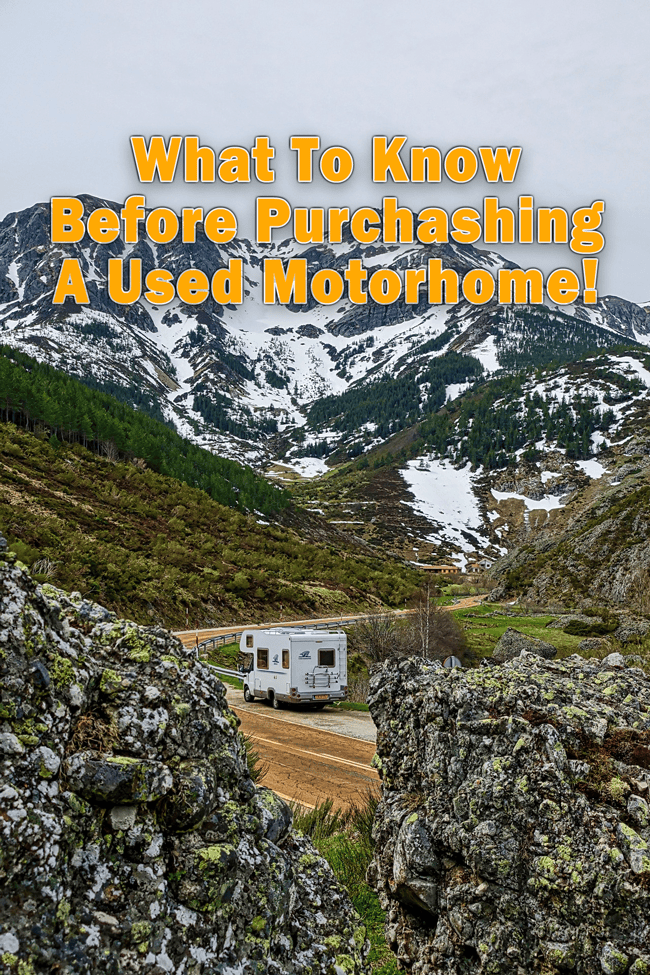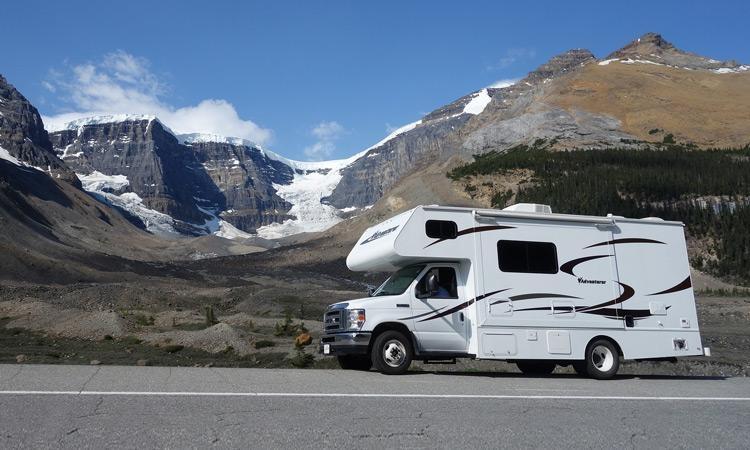Whether you're planning epic guys trips, dreaming of becoming a snowbird, or looking to hit the road for the ultimate adventure, making the decision to purchase a used RV can be a great way to save some cash vs buying new. While the allure of a shiny new motorhome is tempting, smart buyers know that purchasing a pre-owned RV can save substantial money ... but only if you know what to look for. Just like buying a used car, RVs depreciate the moment they leave the lot and this makes gently used models an attractive option. Ultimately, buying a used RV combines all the complexities of purchasing both a vehicle and a house, so here's your roadmap to making a savvy investment in your future adventures.
Do You Like Road Trips?
- Before buying a used RV, always complete a thorough physical inspection, verify maintenance records, and get a professional mechanic's assessment to avoid costly hidden problems.
- Used RVs can offer significant savings over new models, but require careful evaluation of maintenance costs and your own ability to handle repairs.
- Never purchase a used RV sight unseen, as photos can't reveal critical issues with water damage, electrical systems, or mechanical components.
- During the test drive, evaluate not just mechanical performance but also your comfort level driving and handling a large vehicle.
- Come prepared with financing pre-approval and research on fair market values to negotiate effectively when you find the right RV.
- Recreational Vehicles Are Expensive To Maintain
- A New RV Will Lose Value Quickly
- Never Buy a Used RV or Motorhome Without Physically Inspecting It
- Ask The Owner For a History of the Vehicle
- Checklist To Examine Before Purchasing a Used RV
- What To Look For On A Pre-Purchase Test Drive
- Make A Fair Offer And Hope It's Accepted!
- Buying A Used Motorhome Can Be An Exciting Experience
Purchasing a motorhome or RV can be a big investment, and that's especially true for first-time buyers planning their first RV trip. That's why you should know the basics of RV financing. On some levels, it would seem to be a similar process as buying any used car or truck. However, in reality, it has all of the complexities of buying a used car and a house ... all wrapped up in one. Let's take a look at some things you should examine before purchasing a used motorhome.
Recreational Vehicles Are Expensive To Maintain
Recreational vehicles, whether motorhomes, camping, travel trailers, or even converted vans and busses, are now used as homes and are some of the most expensive vehicles to maintain. This is because so many things have to come together perfectly for it to be in proper working order.
Where this comes into play when purchasing a used motorhome is that you need to consider all of these factors and assess your own abilities to maintain the recreational vehicle properly. For some folks this is part of the fun - a constant game of tinkering, fixing broken pipes and wires and other problems, and the infinite amount of customization that comes with those tasks.
For others, no matter how good a lower-price deal they can find on that used RV - it's better for them to buy a new one instead. Despite these challenges though, the RV industry is booming and as we discovered at the RV Hall of Fame in Elkhart, Indiana, it has a long history of helping Americans explore the open roads without feeling constrained by needing a tent or finding a hotel.
A New RV Will Lose Value Quickly
On the flip side though, new RVs lose money quickly and no matter what sort of good deal you think the dealer gave you, purchasing a pre owned rv from a private seller that has all the maintenance records may be the better decision from a strictly financial perspective.
However, that's a tough thing to guarantee since the RV lifestyle has all sorts of different types of people from vagabonds and hippies who live out of their RV consistently to the suburban family who only takes the motorhome on camping trips a couple times per year and otherwise maintains it to a "like new" condition.
You simply can't tell though from looking at photos on a RV buying guide online listing used RVs for sale. That's why it's important to take a closer look at the following tips for purchasing a used motorhome.
Never Buy a Used RV or Motorhome Without Physically Inspecting It
While there are lots of great sites available online to buy a used RV today, there are a lot of factors that you'll need to take into account. This includes not just ensuring that the engine and drivetrain are functioning well but also looking at piping for water and septic, wiring for heating, cooking, and powering appliances, as well as all the elements visible on the surface such as upholstery, dents, dings, scratches etc.
Ask The Owner For a History of the Vehicle
You will want to know why the owner is selling it and if there are any specific disclosures you need to know about. While many previous owners are completely transparent about the good - and bad - parts of the motorhome you are buying, that isn't always the case. That's why it's important to also use tools like FAXVIN to check the history of your new RV or Motorhome. You can even do a trailer vin check on a camping trailer, you don't have to have a motor for the vehicle to have a VIN number. Ideally, the current owner will have a maintenance logbook for you to review as well.

Checklist To Examine Before Purchasing a Used RV
Depending on the type of motorhome or RV in question, it may be valuable to engage a mechanic specializing in motorhomes to do a professional inspection. However, here are the most common areas that you should check before buying a used motorhome:
- Water Damage - visually inspect the entire vehicle for visible water damage. You should look for both leaks from outside water coming in as well as potential leaks around the sink, shower, toilet, and holding tanks.
- Rust Damage - similar to visually inspecting for water damage, rust damage should be a quick indicator of the overall condition of the vehicle.
- Mold - inspect all seams, corners, and other areas where mold might have formed. This is not just an issue for the bathroom or kitchen, but also around windows and even cushions since mold can form anywhere that has been exposed to moisture.
- Lights and Buttons - examine all buttons on the dashboard and control panels to ensure that they light up, switch on/off, and generally do what they are supposed to do.
- Electronics, Appliances, and Outlets - it is important that you check all embedded electronics, electrical systems, built-in appliances, and especially that you check all power outlets as well as the circuit board. You are looking for outright functionality as well as if there seems to be any current stability problems or scorch marks around outlets that might indicate a current or previous issue with surges.
- Floors and Ceilings - make sure that you inspect both the ceilings and floors closely. You'll be looking for any warping, sagging, or discoloration that may indicate hidden damage below the surface.
What To Look For On A Pre-Purchase Test Drive
Buying a used motorhome is a significant investment, and it's important to pay close attention to several factors during a test drive to get market value and ensure that the motorhome is in good condition.
This test drive is more than just looking for things that are wrong or may have been omitted from the RV or previous owner's history. Instead, it is as much about how comfortable you are in driving the vehicle. Afterall, if you feel overwhelmed, or the seat is too firm ... or too soft ... it doesn't mater how much of a good deal you've found on this used RV, the vehicle may just not be right for you to take on a long road trip.
Mechanical Performance
Listen for any unusual engine sounds, ensure smooth acceleration and gear shifts, and verify all dashboard indicators work properly.
Braking and Handling
Check that brakes stop the RV evenly without pulling to either side, and observe how it handles turns and bumps - watching for excessive bouncing or leaning that might indicate suspension issues.
Driver Comfort
Make sure you're comfortable with the driving position, visibility from all mirrors, and that backup cameras (if equipped) function correctly. The ride should be smooth and cabin noise levels should be acceptable.
Onboard Systems
Test all onboard systems - including air conditioning, heat, lights, and appliances. Check tire condition and age (replace if over 5-6 years old regardless of appearance), and be alert for any unusual smells that could indicate water damage or mechanical issues.
Finally, regardless of how the test drive goes and how perfect you think this RV is for your family, it's always a good idea to have a trusted mechanic inspect the motorhome before you buy. They can often spot signs of potential problems that you might miss.
Make A Fair Offer And Hope It's Accepted!
If everything checks out then it's time to make an offer on the vehicle. Here are some key tips to help you make a fair offer on that used RV of your dreams.
Know Your Numbers
Research comparable prices on sites like NADA Guides and RV Trader, and always factor in additional costs like insurance, storage, and maintenance when determining your maximum budget.
Get Professional Validation
Having a professional mechanic's inspection completed will identify any issues that could affect the price and give you solid negotiating leverage.
Come Prepared to Deal
Arrive with pre-approved financing if needed and get everything in writing once you reach an agreement, including any warranties or guarantees about the motorhome's condition.
Remember, negotiating can be a process. Be patient, and don't be afraid to walk away if the deal doesn't feel right.
Buying A Used Motorhome Can Be An Exciting Experience
Purchasing a used motorhome is your gateway to endless adventures - whether that's tailgating at the big game with your buddies or exploring national parks with the family. While the process requires due diligence and patience, the reward is finding that perfect pre-owned RV that balances value with reliability. Remember, the best deals often come to those who take their time and aren't afraid to walk away - because somewhere out there, the right RV is waiting to become your home on the open road. Before you sign on the dotted line, ask yourself not just whether you can afford the RV, but whether you're ready for the lifestyle change it represents.
